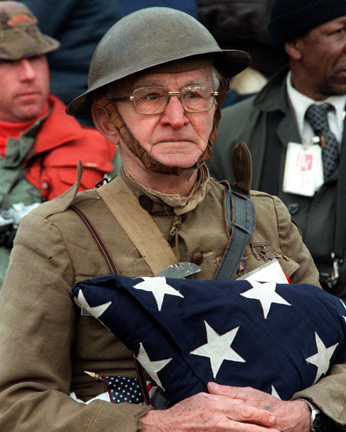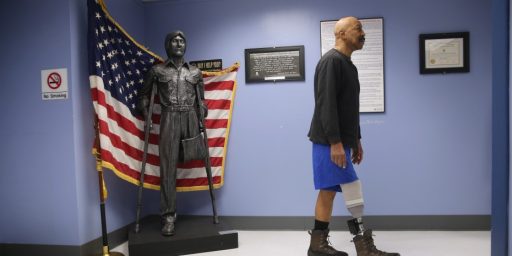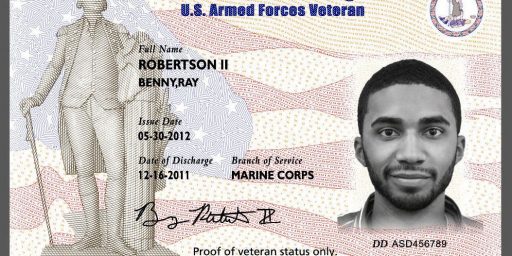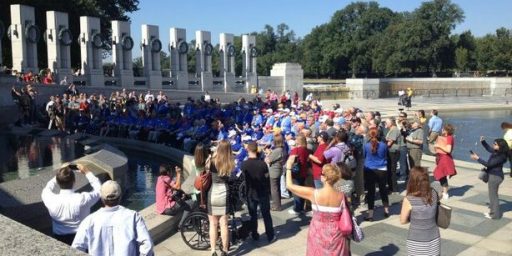Memorial Day v. Veterans Day
I’ve seen a few gripes on Twitter and elsewhere about President Obama and others seeming not to understand the difference between Memorial Day, which is set aside to honor those who died in combat, and Veterans Day, which honors those who served in the military.
This has long been a pet peeve of mine but the conflation of the two is now so universal that I’ve given up fighting it. I’ve been at Veterans Day events run jointly by the Veterans of Foreign Wars and the American Legion where they plays Taps and read off a roll call of those who have died over the last year. Similarly, Memorial Day events typically pay tribute to those who have served and, especially, those who now serve.
We shouldn’t be surprised that this happens. Aside from the fact that 35 years of an all-volunteer force mean that relatively few have served, the two instances overlap considerably. Obviously, all who died in war are veterans. Beyond that, though, we honor veterans because they have risked death in war, whether physically (by having gone to war) or theoretically (by being available for deployment). And when we honor those who have fallen in past wars, it’s only natural to pay at least passing homage to those currently risking their lives in ongoing wars or those who did so in past wars and lived to tell the story.
Of course, for the vast majority of Americans, these are simply “days off” and accorded all the reverence and reflection we reserve for any other holiday.
Photo: Joseph Ambrose, an 86-year-old World War I veteran, attends the dedication day parade for the Vietnam Veterans Memorial in 1982, holding the flag that covered the casket of his son, who had been killed in the Korean War. (U.S. Government Photo)







Once these holidays became detached from the actual events they commemorated this was inevitable.
I recognize that I’m in a vanishingly small minority on this but I think that either Decoration Day and Armistice Day, not to mention Washington’s Birthday, either ought to be restored or the ersatz holidays that have supplanted them should be abolished. The ability to pass on and learn from events that we haven’t experienced personally is one of the things that distinguishes us as human beings and part of the fabric of a culture.
Yeah, the problem is that all these things just become days off. Even Martin Luther King Day, which is relatively new and commemorates a person whose exploits occurred well within living memory, is mostly a day to go to the mall (or whatever it is one does with a 3-day weekend in January). For that matter, even Christmas and Easter are mostly secular pageants.
I’m a veteran myself and knew some folks who were seriously wounded or died in the current wars. I’m not any more reflective of the nature of sacrifice today than I was yesterday or will be a week from Tuesday.
Free nations only exist because brave men are willing to fight, and risk death, to defend them. We have an obligation to honor our past heros, because we will need more heros in the future.
Well you will be happy to note that our elementary school has assemblies to recognize both holidays the Friday before Memorial Day and the day before Veteran’s Day.
We also take the time to define the difference.
But I can see where the two are conflated, since there is overlap.
The other reality is that combat medicine has advanced to the point were large numbers of the soldier who formerly would have been dead are still alive but severely disabled.
In extreme cases there are veterans who are completely paralyzed and/or suffering massive brain trauma. One could argue that spending decades trapped in a barely functioning body is in some ways a worse fate than being killed outright. So it make sense for me on memorial day to remember both the dead and the wounded.
which is set aside to honor those who died in combat
Is this right? What about, say, the Civil War dead who died of disease?
I would say that even those who die in modern-day training accidents die “in service,” which ought to suffice.
Which is why I fly a flag on every national holiday except Memorial Day. I have no way to fly it at half mast.
And I do believe the phrase is “who died in the service of their nation.” I may be in error on that, but that is the way I treat the day.
You should see some of the funny looks I get because I say happy Independence day instead of happy 4th.
You mean you don’t get funny looks before you even open your mouth…
Hey, lol, maybe thats it….
This is actually an afterthought. The advocates of “Veterans Day” hijacked Armistice Day–which commemorated the end of the Great War.
Since WWI vets are basically all deceased we can stop celebrating so-called “Veterans” nee Armistice Day.
I would suggest that we scrap Nov. 11th and shift to honoring more recent vets in the form of “Mission Accomplished Day,” May 1.
That way we get to celebrate our victory over Iraq and we likewise would get two days off in May.
Poor is the nation who has no heroes.
Poorer still is the nation which has them but forgets them. – Churchill
My father lost any # of friends over Japan and almost lost his own life on more than a few occasions. It was pure luck that he came back and not them.
I honor all of them on this day.
That may be true….or…I live in a small town bubble where everything was Red White and Blue, there were WWII era flyovers and, EVERYBODY, cheering those that served via small town parade. True or not, i’ll stick with my small town midwest flavor of what memorial day means.
Of course, the real irony is that the United States now has two separate days to honor members of what the Founding Fathers considered abhorrent–a standing army.
James,
I honestly never realized that Memorial Day was specifically/solely for those who died in combat; how might you rate the appropriateness of using today to honor someone (my undergraduate advisor) who served in WWII, Korea, and Vietnam, but who has now passed?
Just curious about the nuances of all this …
It’s not what the holiday was designated for but it seems an entirely appropriate thing to do.
James, Rev. Sensing appears to disagree. My earliest memories of Memorial Day are decorating the gravesite of my grandfather who died three decades after fighting in WWII. Plus, as I understand the national cemetery policy appears to be to place a flag on the grave of all veterans, not merely those who died in service.
Also, the Civil War veterans used Memorial Day/Decoration Day by the end of the nineteenth century in a way that gave honor to veterans in general.
The British do a better job at this than we do – Armistice Day gets everyone wearing red poppies to remember the people in the war. Plus, this probably adds to the confusion over the holidays – people in other countries view November 11th as a combination of honoring soldiers, living and dead (mostly those who died). Even though most Americans don’t know this, I’m sure they come across this idea from time to time (“Veteran’s Day around the world” segments on the news and such.